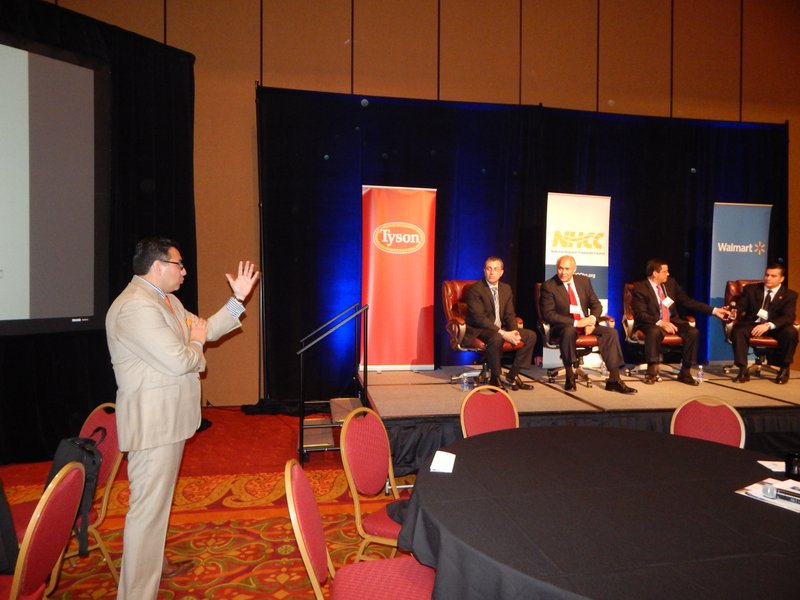Area leaders hope a collaborative effort will help immigrants find resources they need to integrate into the community.
EngageNWA started as a Northwest Arkansas Council committee exploring diversity inclusion and hopes to become an information and action hub.
Population makeup
U.S. Census Bureau race estimates as of July 1
Race Benton County Washington County
White alone, not Hispanic or Latino 75.3 percent 72.6 percent
Hispanic or Latino 16 percent 16.1 percent
Native Hawaiian and other Pacific Islander 0.4 percent 2.4 percent
Asian 3.4 percent 2.6 percent
Black or African American 1.9 percent 3.4 percent
American Indian and Alaska Native 1.9 percent 1.5 percent
Source: U.S. Census Bureau
"The community, in large part because of the corporate leadership here, understands that we are stronger, it's a more interesting place to live and we are more successful economically as we grow our diversity and as we welcome the talent that moves in," said Mike Malone, Northwest Arkansas Council president and CEO.
He said physical infrastructure needs and projects led business leaders to form the council 25 years ago. That focus expanded to include social infrastructure and quality of life initiatives several years ago, he said.
Northwest Arkansas is much different than 25 years ago when nearly 96 percent of residents in the two-county area were non-Hispanic whites and Hispanics accounted for 1.4 percent of the population, according to the U.S. Census Bureau. That balance shifted in 2013 to 74 percent non-Hispanic white and 16 percent Hispanic.
The Hispanic community is not the only minority group growing. The black population grew from 1 to 3 percent between 1990 and 2013 and today nearly 3,000 eastern Indians and more than 4,300 Marshallese call the area home.
EngageNWA is designed to help people of all ethnic backgrounds. The program has slowly evolved, starting with the region's first Diversity Summit in November 2012.
Many groups were also doing their own thing. Local corporations, including Wal-Mart Stores and Tyson, were creating and honing minority employee development programs.
The Cisneros Center for New Americans opened a year ago in Springdale and is developing programs to help immigrants integrate into Northwest Arkansas.
The University of Arkansas for Medical Sciences is in the midst of a pair of grants working on health disparities for the Hispanic and Marshallese communities.
A more coordinated approach was needed, Lee Culpepper, Wal-Mart's vice president of corporate affairs, said Wednesday during a session of the National Hispanic Corporate Council's spring summit.
"I went to Mike Malone and Ed Clifford at the Jones Trust and talked to Tyson and said we need to see how we can all work together," he said. "The government is not going to do this, but we know it is important and we can make change. We can make change here."
Wal-Mart and Tyson provided startup money for EngageNWA in April 2013.
Last year consisted of input sessions with business leaders and community members to determine what the area's needs are. Geovanny Sarmiento, vice president of minority business development for the Rogers-Lowell Area Chamber of Commerce, was hired as executive director in January and a marketing and communications manager will be hired in the next few days.
"Today we have more than 30 partners," Sarmiento said. "We want to be a model community for the rest of the state and even the rest of the country."
He said EngageNWA will soon start making recommendations for changes that will help three groups of immigrants the program determined were most in need: immigrants from abroad, business relocatees and secondary and post-secondary students.
Jennifer Aguirre and Jacob Perry, American Dream fellows for the Cisneros Center, are spearheading the new immigrant initiative.
"We have a subcommittee that will work with policy advocacy," Perry said. "This is very in line with what the center has done."
The Cisneros Center opened its pilot program in Springdale because of the area's growing immigrant population, the need for services and leaders' desire and ability to make changes, Aguirre said.
Perry said they are in the "developing a plan" stage. A mobile friendly platform connecting people to resources will be launched soon. Americandreamguide.us will launch in the next few weeks and feature 300 Northwest Arkansas services providers ranging from education to churches.
"People will know where to go for the things they need," he said.
Pearl McElfish, director of the University of Arkansas for Medical Sciences Office of Community Health and Research, said her department has also created a resource guide providing information on support services, specifically geared to the Hispanic and Marshallese communities.
The medical school is managing about $5 million in grant money studying health disparities among the Hispanic and Marshallese populations.
McElfish said a couple of staff members serve on the EngageNWA committee.
"It is something we see as an integral part of our mission," she said. "We want to make sure health equity is part of any overall initiatives."
Mary Lee, deputy director of PolicyLink, spoke to community members Friday about the role of race and place in health disparities.
She said creating coalitions is a great way to create a comprehensive plan.
"Make sure the people at the table are representative of Northwest Arkansas," she said. "Don't have tunnel vision for your one goal."
Lee said Northwest Arkansas is at a good place because the conversations about diversity and inclusion are under way and the area shows a strong economy, good housing, strong education and high levels of employment.
She warned the area's prosperity will suffer if any part of the population is left behind.
"You are starting from a great place, and if you are intentional about those good opportunities, it puts you ahead of the curve," she said. "On the other hand, if you look away from it, what is definitely coming to Northwest Arkansas is a reduction in the quality of life for everyone."
NW News on 05/25/2015

